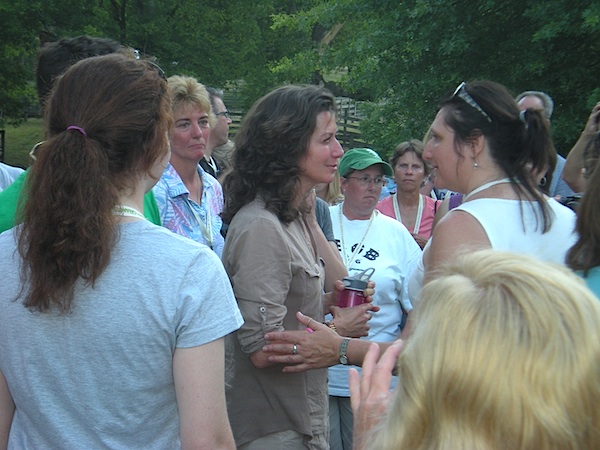Arts & Entertainment
Gays prominent at Amy Grant’s Nashville weekend
Gathering reminds how much is missing of singer’s touring history
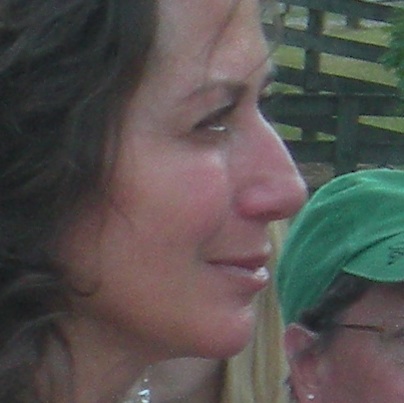
Weekend before last, a friend and I made a road trip to Nashville to spend a weekend with Amy Grant and 550 of her nearest and dearest. It was a great weekend — $50,000 was raised for various charities Grant supports, the music performed (almost all requests) was a long-time fan’s dream come true and the Gospel Music Hall of Famer and six-time Grammy winner was as accessible and approachable as was realistically possible considering those attending were among the all-time die hards, a few of whom had vulture-like tendencies everytime Grant appeared.
That gays — and at least one lesbian couple and one trans woman — were among the group was hardly surprising. We’ve been among the most vocal in her fan circles for years. Most non-church folks remember Grant only for a few early ’90s hits (“Baby Baby,” “Every Heartbeat”). Though her catalog has aged well, she’s not deemed terribly high on the hip quotient. Even one of the charity recipients said, “Amy Grant — isn’t she Vince Gill’s wife?”
But for a generation of gay men who grew up in Baptist and Evangelical churches in the ’80s, Grant was so much more than that and, no exaggeration, a lifeline. Contemporary Christian Music had its own parallel universe divas — Sandi Patty, Twila Paris, Margaret Becker, et. al. — and Grant, who in many ways had and maintains a very non-diva-esque persona, was queen of the lot. But that’s just one of the ironies of Grant’s career — she also stumbled into the music biz without really trying, has always been upfront about her modest pipes (she’s really a better songwriter than singer) and, despite a bounty of RIAA Platinum albums, never fully fit in in either the gospel or pop establishments.
Those of us in fan circles have discussed ad nauseum Grant’s public handling of her gay fans (or lack thereof). She’s warm, friendly, gamely poses for photos with male couples, etc., but is careful never to state her personal feelings one way or the other. One understands to a degree — she’s in a no-win situation. As was obvious from the attendees last weekend, most of Grant’s fans are Gen. X and post-Boomer soccer moms from the Bible belt. We all seem to mix pretty well. I hope they feel the same. But Grant would alienate a large part of her fan base if she were to come out one way or the other on her feelings of the Bible and homosexuality. There’s a clamoring among gay fans, of course, for her to be more unequivocal. Nobody’s expecting Lady Gaga-caliber activism, but heck, even the late Tammy Faye Bakker Messner was more openly gay accepting than Grant. Perhaps, though, having lost everything already, Tammy Faye had nothing left to lose (Tammy Faye even joined us at Capital Pride about 10 years ago …. Ahhhh, Tammy Faye, how I miss thee).
Grant does occasionally take risks — it will undoubtedly seem like a non-issue to many, but monogrammed bottles of Jack Daniels with Amy Grant nameplates were sold for $100 a pop at her farm, which she opened to guests on June 23. It all went to charity but the irony was delicious — I’m old enough to recall the outraged reactions in the ’80s when Grant said in an early interview that she occasionally imbibed. Folks at my parents’ church were apoplectic.
It’s never been a big deal to me, either the booze or the gay stuff. Some fans, so eager to glean the slightest glimmer of acceptance (are we really that desperate for validation?), latched on to an off-the-cuff remark she made during the weekend when a guest southern gospel singer, telling a story about a drag queen who’d parodied his wife, said his group had a large gay following (Grant acknowledged she did as well).
The draws for me have always been Grant’s music and personality. There’s a freshness, a buoyancy, to her music that, though it sounds stylistically dated, never really goes away. It goes back to the first album — lyrics and energetic Brown Bannister production around lines like, “The sun woke me up real early it’s a beautiful morn/so I’m goin’ down to the river to be reborn” still resonate 35 years after they were put down on wax. My parents, both products of stodgy, old school mainline and Roman Catholic versions of Christianity, had early-’70s born again experiences and for them and their fellow Boomers, there was a parallel Jesus music/born again fever sweeping the country the same time Stonewall and the modern gay rights movement was kicking off. This is no coincidence — hippie ideals weren’t sustainable, of course, but what they did bring us was a shucking off of the ’50s mindset on all kinds of issues. In terms of gay stuff, faith, and a whole lot more, this was not your parents’ (my grandparents’) America. Grant got in on sort of the tail end of that but shot off into the stratosphere in the early ’80s. By then, things had calmed down and she became the voice of a churchgoing, Bible Belt generation with songs like “El Shaddai,” “Sing Your Praise to the Lord” and “Thy Word.”
Bored eventually with straight-up gospel, she gradually started flirting with pop music and following a hit No. 1 duet with Peter Cetera in ’87 (“Next Time I Fall”), she had a full-on hit pop album of her own by 1991 (“Heart in Motion”). But she never fully went one way or the other. At the point in which an all-out pop album would have made the most sense — just following the Cetera hit — she went the other direction and made an impressionistic gospel album, “Lead Me On.” Its singles tanked on pop radio but it went onto become her critical peak and has been called (by CCM magazine, et. al.) the best gospel album of all time. Likewise, when “Heart in Motion” was going through the roof a few years later, Grant was careful to let people know she hadn’t sold out as she was so often accused of doing by the hardliners (she gets bonus points, in my opinion, for having been condemned by Jimmy Swaggart). The album closes with the all-out praise song “Hope Set High” (“if there’s anything good that happens in life, it’s from Jesus”), a song she memorably performed last weekend.
So were the young gays of the era, hopelessly stranded in the Bible Belt with no hope of escape until college, just latching on to the closest thing we could get to a lighthouse in Grant? Not really — it’s deeper than that. I and many I know were also listening to Madonna, Janet Jackson, Cyndi Lauper and Tina Turner (we all figured “Private Dancer” was her first album) back then too, even if we had to sneak their tapes into the house. It’s hard to know if Grant meant any of this intentionally or if it was her own way of sneaking in some stuff past the gatekeepers, but there are glimmers of gay hope dotted all throughout her discography from as early as 1980 when she sang the lyrics her then-husband, Gary Chapman, had written (“all I ever have to be is what you made me/any more or less would be a step out of your plan”) to her own lyrics just a year later (“being this person inside of me/unafraid of being me/no more faces to hide behind …/even if I am the only one who wants to fly”) and even much later, with the 2003 song “Out in the Open” (“there is no jury, there is no judge/ready and waiting are the steady arms of love”). If it all sounds vague or like searching for something that’s not there, keep in mind, more often than not, Grant was nearly as subtle with her Christian references. It seems laughable now, but people used to parse her lyric sheets and balk at how few references there were to Jesus and/or God anytime she had a new album out, noting how increasingly infrequent they were becoming.
I don’t particularly care what Grant’s personal views are on homosexuality. Sure, it would be great if she would at least take the Dolly Parton approach to embracing/acknowledging us. Lord knows we need all the help we can get on the LGBT rights front where each step ahead feels like pulling teeth. But conversely, what does it say about us as fans if we need some sort of acknowledgement from our favorite singers? I do get it — when you’ve invested emotionally and financially in a singer/brand who’s meant so much to you, especially during the raw, painful formative years (and let me tell you, it’s lonely being the only gay fish in an evangelical, Bible Belt pond when you’re 13), it means a lot to know those you admire are on board. But as adults, ultimately that need for validation says more about our own desperation than anything it might suggest about Grant. For the record, Sandi Patty, perhaps my other all-time favorite singer, is just as evasive. There are quietly gay people in her camp and she once told a group of gay fans who hosted a tribute post-show event for her in New York that she was “feeling the love,” but she, too, stops short of any condoning type-of statement. They’ll both talk to any small-town newspaper in which they happen to have an upcoming show, yet my Blade interview requests go curiously unacknowledged. Perhaps they feel they’ve already rocked their Christian fan bases enough having spent the last 10-15 years rebuilding after each going through controversial divorces (Sandi’s first husband, John Helvering, and Amy’s, Gary Chapman, were huge parts of their touring entourages in the ’80s; John ran sound for Sandi; Gary was Amy’s band director on several of her biggest tours).
My ultimate frustration with loving these singers falls into a whole other category entirely — to my endless chagrin, whole chapters of their touring history are missing in action. Sure, I love mainstream pop and rock too, but if you’re a Stevie Nicks fan or, merciful heavens, a Tori Amos fan, and you’re willing to look in some, ahem, unofficial places, you can find audio circulating of practically every show they’ve ever done. Same with the Stones, Bob Dylan, Springsteen — all the big dogs you’d expect. Other acts, like Pearl Jam, have recognized the insatiable appetites of their staunchest legions, and have released “official” bootlegs, manna from heaven for those who’ve worn out the studio recordings and spent many hard-earned dollars following them around. Even Cyndi Lauper, who traditionally has varied up her live show way more than, say Madonna or Janet, has a surprisingly rich bevy of fan-generated recordings out there. Different artists have different feelings on this sort of thing (the Grateful Dead famously encouraged it), but the sticking point for many is that it’s OK as long as you don’t attempt to profit off it.
Amy and Sandi both fall into that category — Sandi didn’t even bat an eye when people plunked down camcorders on mini-tripods at a Nashville event she hosted last year — and yet huge swaths of their concert-giving history are unaccounted for. And I’m not talking about obscure stuff, either — tours like Amy’s “Heart in Motion Tour” and Sandi’s “Another Time Another Place Tour” were mammoth operations playing arenas for months on end all around the country 20 years ago. On one hand, it’s not terribly shocking — these are not singers, historically, with wildly inventive bands who shook up their set lists drastically from night to night. However, when 25 years has gone by and you can’t even find a complete set list and no official live album or VHS concert tape was ever released, this brings its own level of frustration. These people have spent half their lives on the road, yet there’s precious little evidence that they’ve even left their living rooms.
Just for the record, my holy grails in this vein are — Sandi: anything pre-’83, the ’84-’85 “From the Heart Tour” (her first cross-country jaunt), the ’91-’92 “Another Time Another Place Tour” or the ’98 “Artist of My Soul”-era dates. For Amy: always wondered how complete the “Age to Age” concert video is — at 90 minutes including Gary’s set, one imagines a few numbers might have ended up on the cutting room floor. Only a handful of individual numbers have ever surfaced from the 18-month-long “Unguarded Tour” — surely somebody taped this at least one night (soundboard tapes were reportedly made each night but have never surfaced in fan circles). Also curiously missing from trading circles is her biggest tour ever — the “Heart in Motion Tour.” Audio has been known to exist, but nobody I’ve ever talked to claims to have it. I’m totally down for a no-profit swap if anybody has any of this stuff.
If there’s an upside to all this, it’s that Amy and Sandi are still out there and active. Patty records regularly and has released an album almost every year of the last decade. Grant only records here and there (she’s reportedly working on a new album), but she tours almost constantly. It’s a blessing I don’t take for granted as a few of my other favorites from the era — Paris and Becker — have, with precious few exceptions, completely stopped recording and touring.
Time to move on and get a life? Yeah, probably, but isn’t it uncanny how deep the nerve is that takes you back to the first music you ever discovered on your own? For me, it defies explanation. And so the quest/obsession continues. I’m even — don’t laugh — planning to check out a D.C. Women of Faith conference in August. Ordinarily I’d rather sit home and watch paint dry (I’ve left much of that theology long behind), but — holy of holies — Amy and Sandi are BOTH scheduled to be there!

A protest was held outside of the White House on Saturday following the killing of Renee Nicole Good by a U.S. Immigration and Customs Enforcement agent in Minneapolis. Across the Potomac, picketers held signs calling for “Justice for Renee” in Tysons, Va.
Demonstrations were held in cities and towns across the country, according to multiple reports. A march was held yesterday in Washington, D.C., as the Blade reported. Further demonstrations are planned for tomorrow.
(Washington Blade photos by Michael Key)
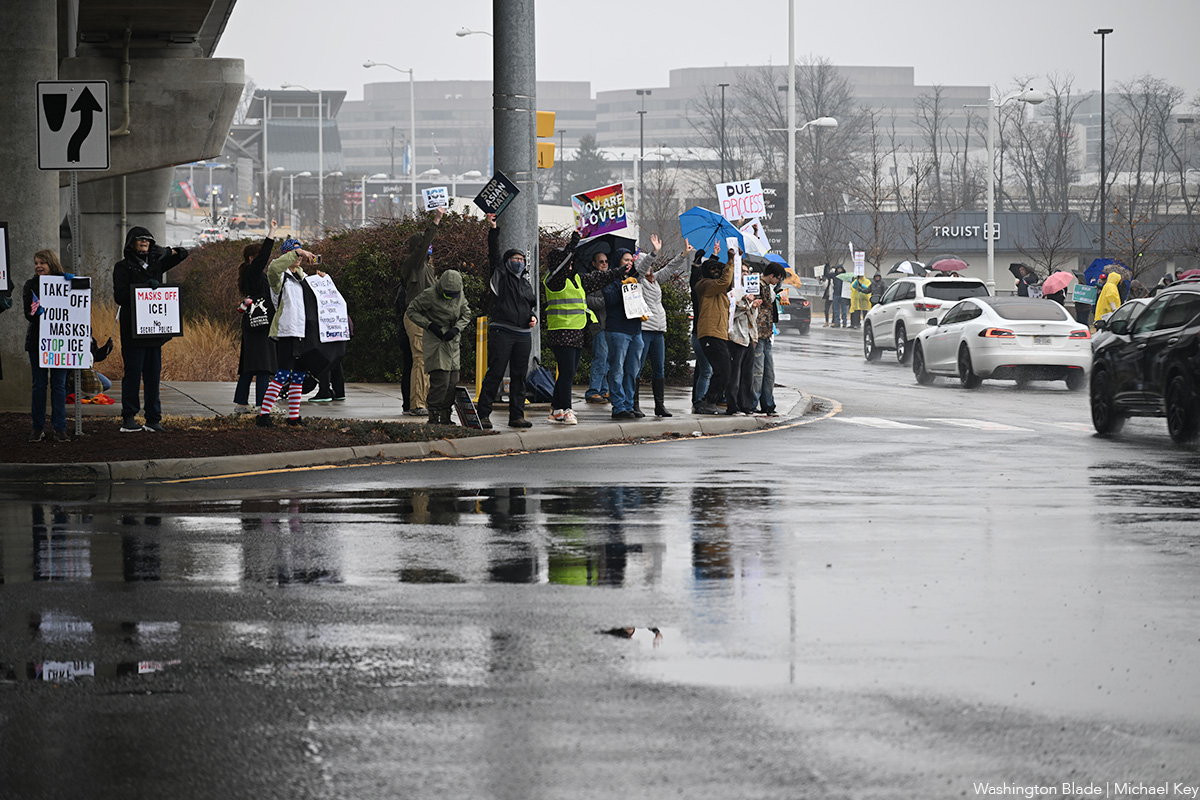
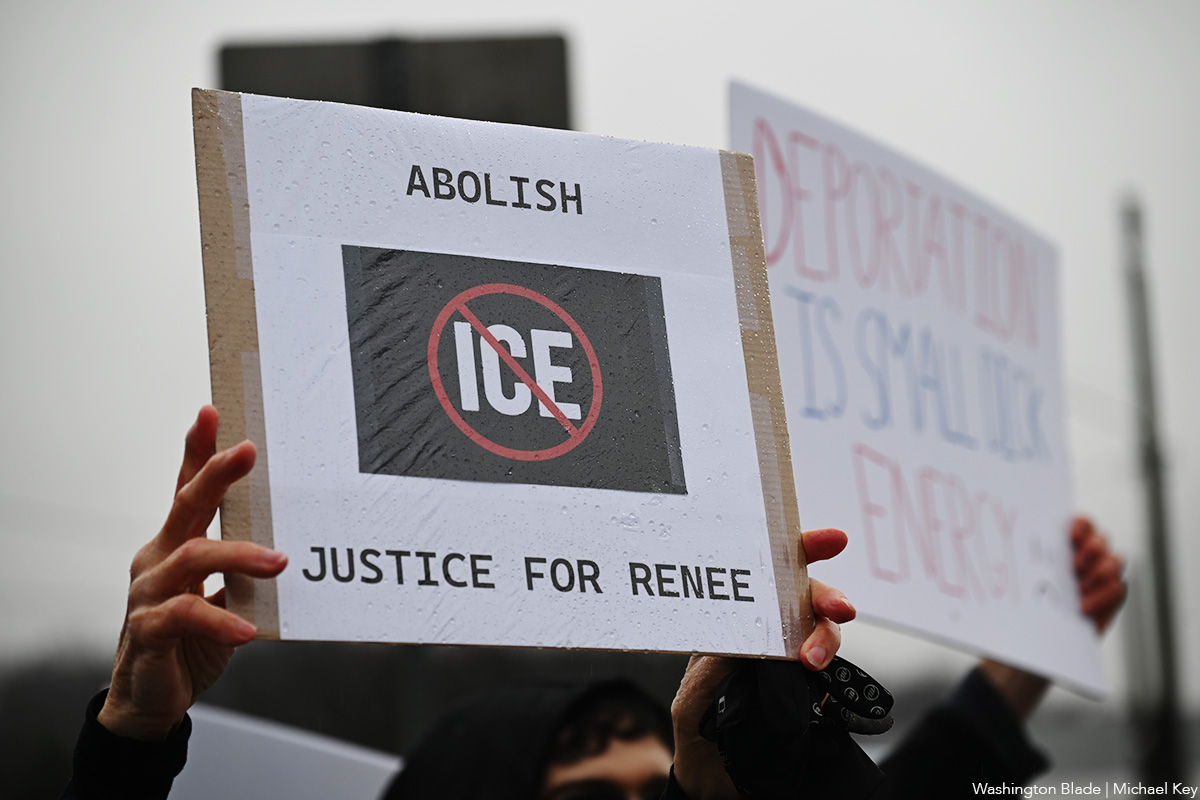
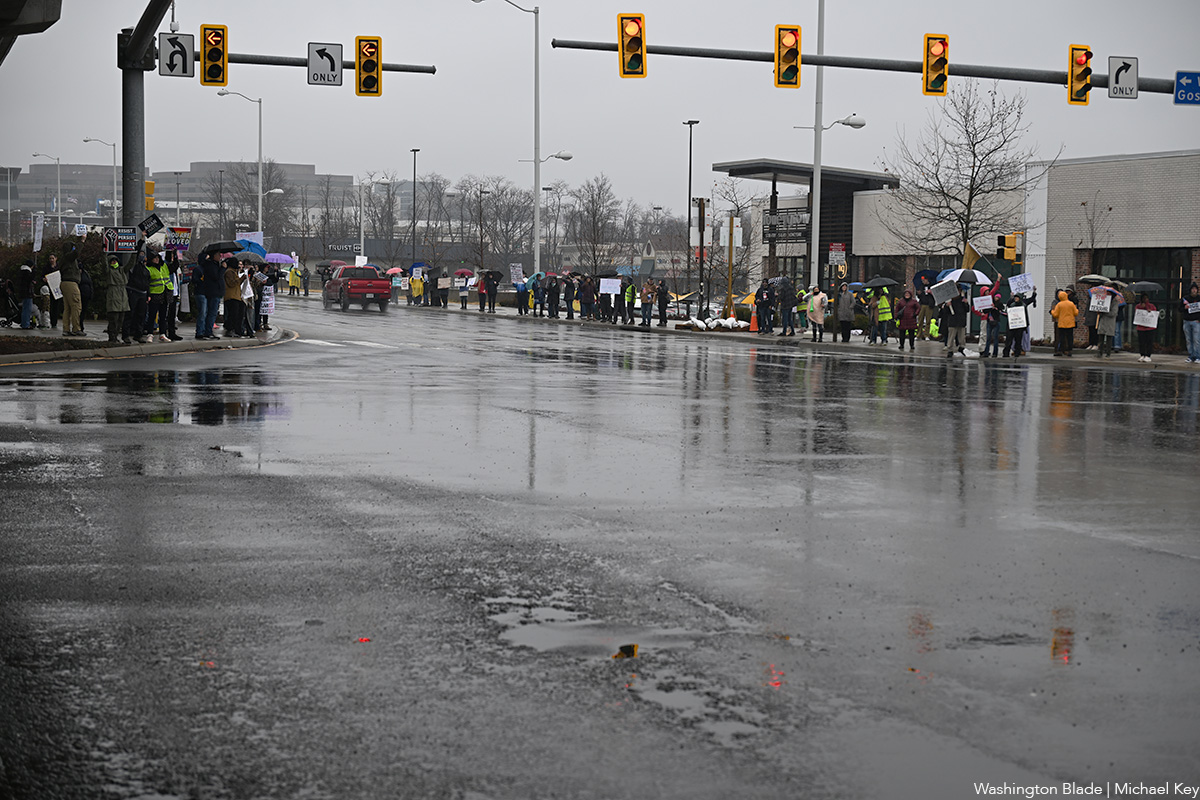
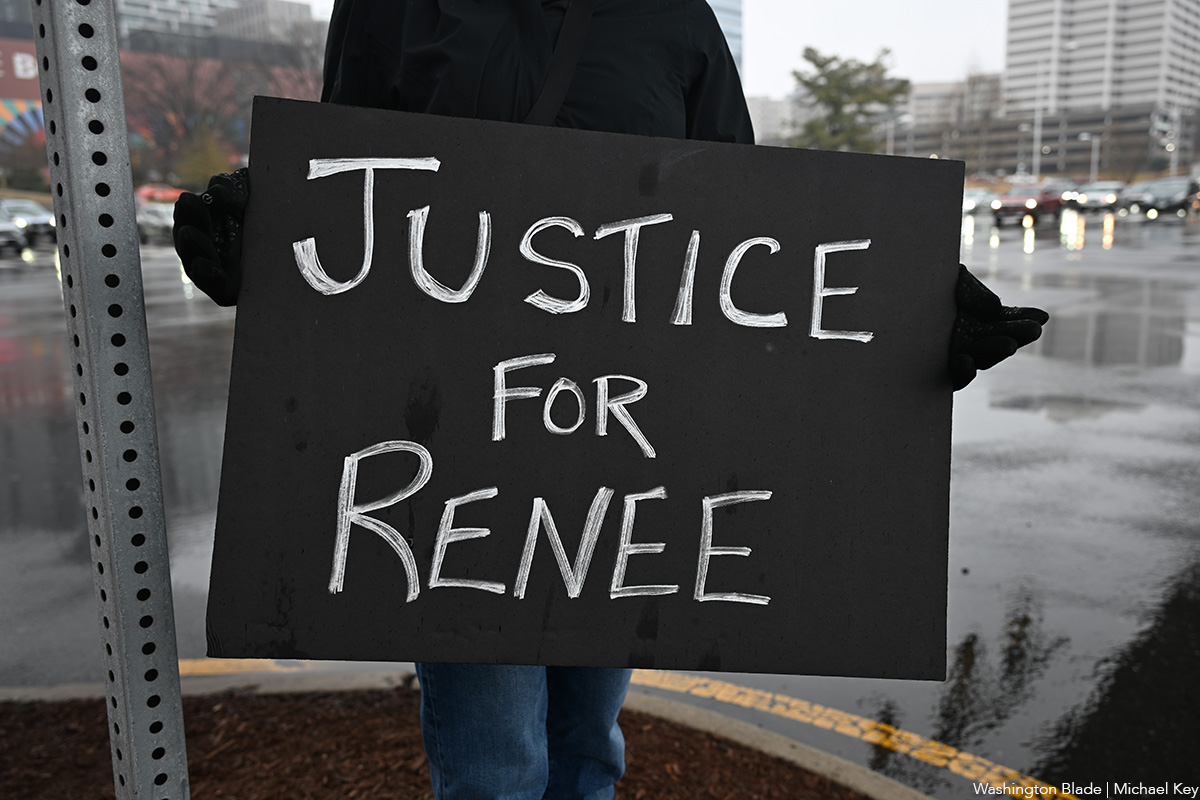

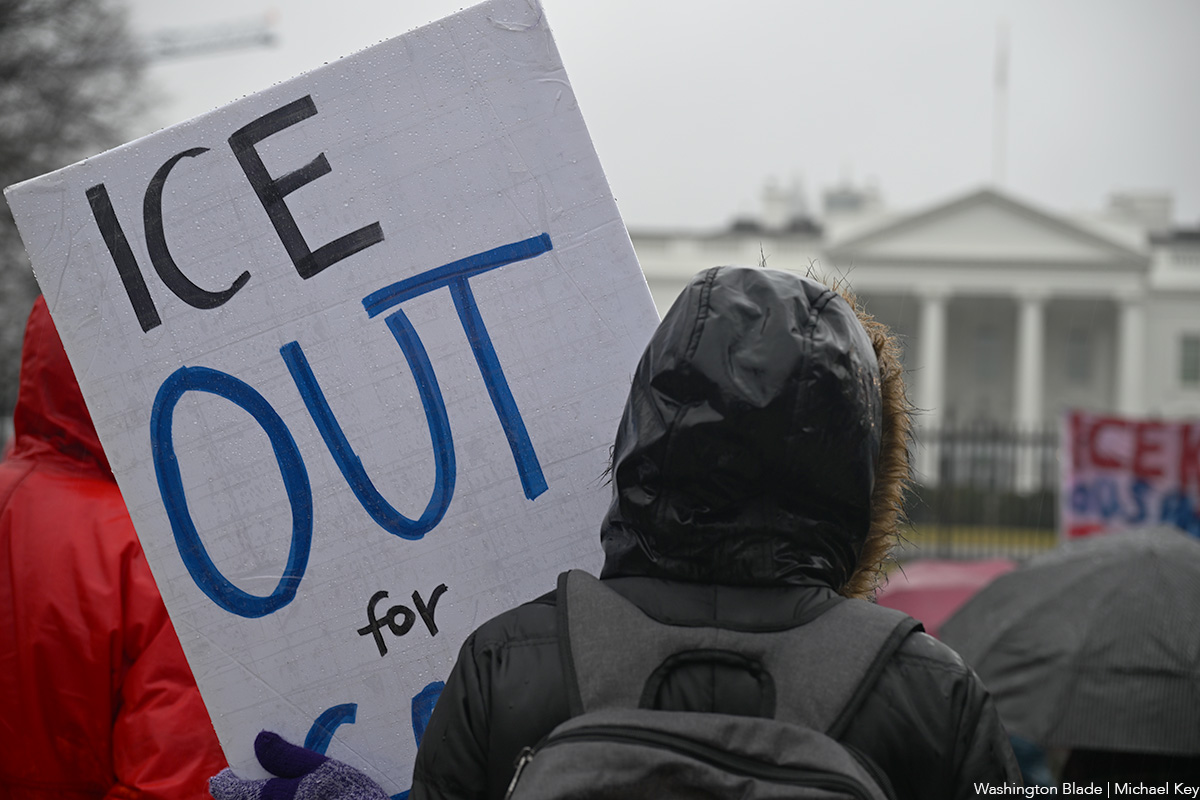
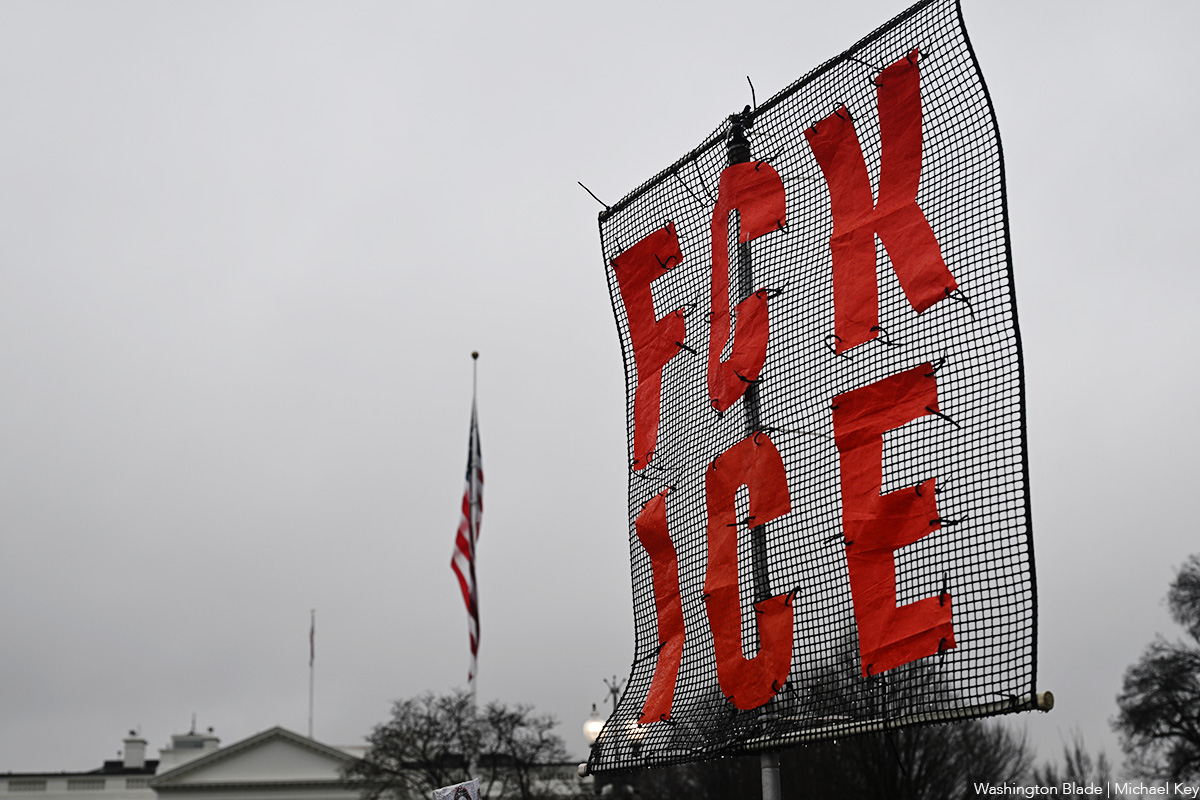
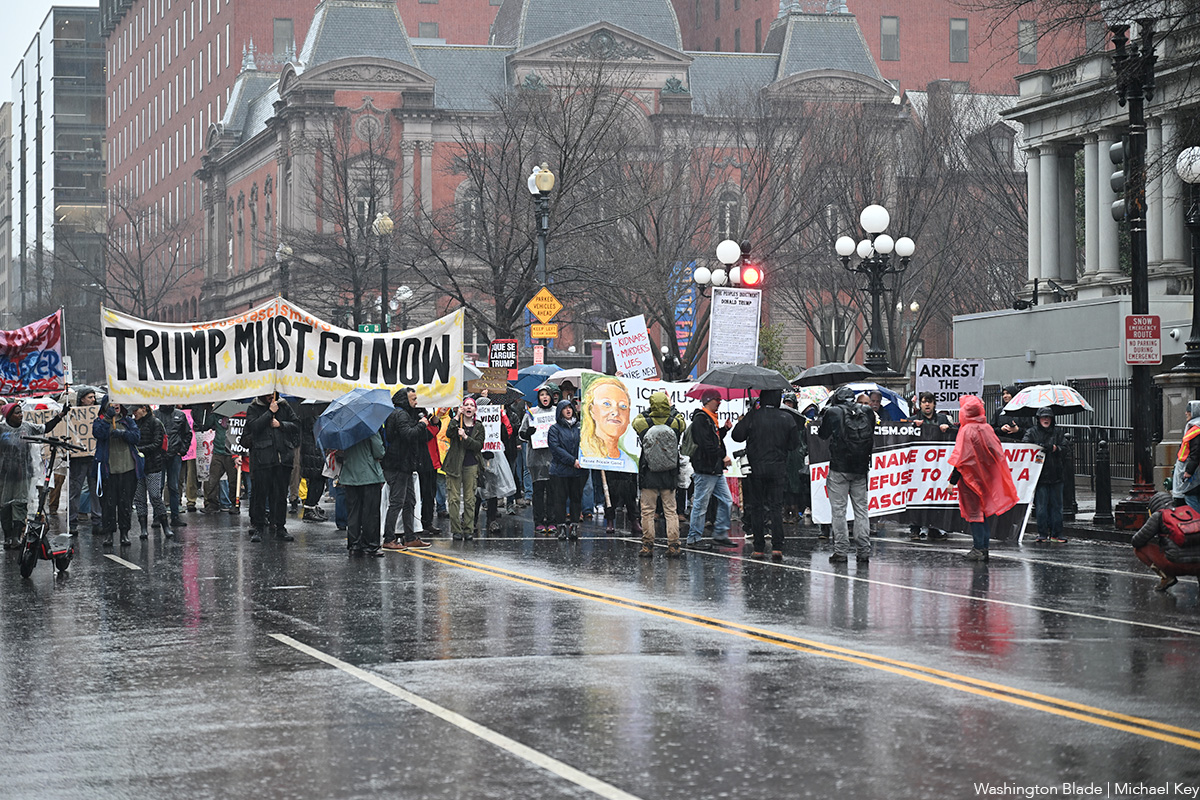

Books
Feminist fiction fans will love ‘Bog Queen’
A wonderful tale of druids, warriors, scheming kings, and a scientist
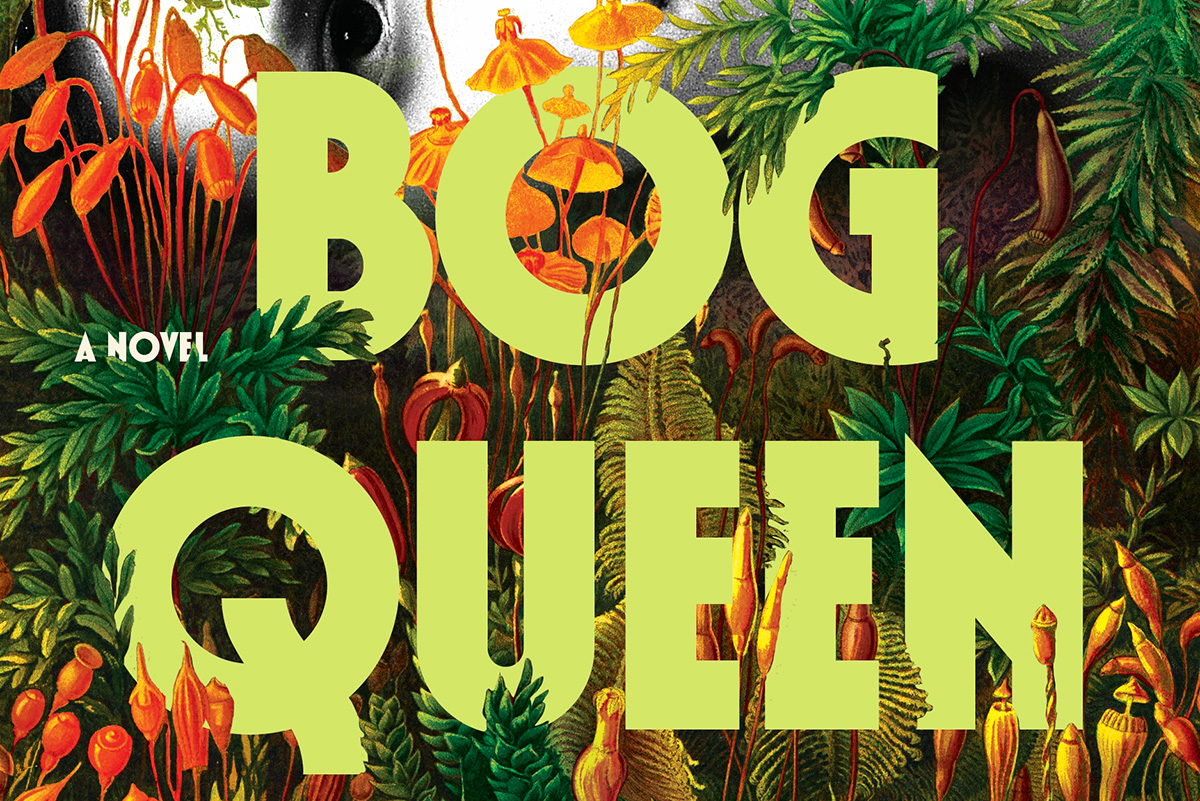
‘Bog Queen’
By Anna North
c.2025, Bloomsbury
$28.99/288 pages
Consider: lost and found.
The first one is miserable – whatever you need or want is gone, maybe for good. The second one can be joyful, a celebration of great relief and a reminder to look in the same spot next time you need that which you first lost. Loss hurts. But as in the new novel, “Bog Queen” by Anna North, discovery isn’t always without pain.

He’d always stuck to the story.
In 1961, or so he claimed, Isabel Navarro argued with her husband, as they had many times. At one point, she stalked out. Done. Gone, but there was always doubt – and now it seemed he’d been lying for decades: when peat cutters discovered the body of a young woman near his home in northwest England, Navarro finally admitted that he’d killed Isabel and dumped her corpse into a bog.
Officials prepared to charge him.
But again, that doubt. The body, as forensic anthropologist Agnes Lundstrom discovered rather quickly, was not that of Isabel. This bog woman had nearly healed wounds and her head showed old skull fractures. Her skin glowed yellow from decaying moss that her body had steeped in. No, the corpse in the bog was not from a half-century ago.
She was roughly 2,000 years old.
But who was the woman from the bog? Knowing more about her would’ve been a nice distraction for Agnes; she’d left America to move to England, left her father and a man she might have loved once, with the hope that her life could be different. She disliked solitude but she felt awkward around people, including the environmental activists, politicians, and others surrounding the discovery of the Iron Age corpse.
Was the woman beloved? Agnes could tell that she’d obviously been well cared-for, and relatively healthy despite the injuries she’d sustained. If there were any artifacts left in the bog, Agnes would have the answers she wanted. If only Isabel’s family, the activists, and authorities could come together and grant her more time.
Fortunately, that’s what you get inside “Bog Queen”: time, spanning from the Iron Age and the story of a young, inexperienced druid who’s hoping to forge ties with a southern kingdom; to 2018, the year in which the modern portion of this book is set.
Yes, you get both.
Yes, you’ll devour them.
Taking parts of a true story, author Anna North spins a wonderful tale of druids, vengeful warriors, scheming kings, and a scientist who’s as much of a genius as she is a nerd. The tale of the two women swings back and forth between chapters and eras, mixed with female strength and twenty-first century concerns. Even better, these perfectly mixed parts are occasionally joined by a third entity that adds a delicious note of darkness, as if whatever happens can be erased in a moment.
Nah, don’t even think about resisting.
If you’re a fan of feminist fiction, science, or novels featuring kings, druids, and Celtic history, don’t wait. “Bog Queen” is your book. Look. You’ll be glad you found it.
Movies
A Shakespearean tragedy comes to life in exquisite ‘Hamnet’
Chloe Zhao’s devastating movie a touchstone for the ages

For every person who adores Shakespeare, there are probably a dozen more who wonder why.
We get it; his plays and poems, composed in a past when the predominant worldview was built around beliefs and ideologies that now feel as antiquated as the blend of poetry and prose in which he wrote them, can easily feel tied to social mores that are in direct opposition to our own, often reflecting the classist, sexist, and racist patriarchal dogma that continues to plague our world today. Why, then, should we still be so enthralled with him?
The answer to that question might be more eloquently expressed by Chloe Zhao’s “Hamnet” – now in wide release and already a winner in this year’s barely begun awards season – than through any explanation we could offer.
Adapted from the novel by Maggie O’Farrell (who co-wrote the screenplay with Zhao), it focuses its narrative on the relationship between Will Shakespeare (Paul Mescal) and his wife Agnes Hathaway (Jessie Buckley), who meet when the future playwright – working to pay off a debt for his abusive father – is still just a tutor helping the children of well-to-do families learn Latin. Enamored from afar at first sight, he woos his way into her life, and, convincing both of their families to approve the match (after she becomes pregnant with their first child), becomes her husband. More children follow – including Hamnet (Jacobi Jupe), a “surprise” twin boy to their second daughter – but, recognizing Will’s passion for writing and his frustration at being unable to follow it, Agnes encourages him to travel to London in order to immerse himself in his ambitions.
As the years go by, Agnes – aided by her mother-in-law (Emily Watson) and guided by the nature-centric pagan wisdom of her own deceased mother – raises the children while her husband, miles away, builds a successful career as the city’s most popular playwright. But when an outbreak of bubonic plague results in the death of 11-year-old Hamnet in Will’s absence, an emotional wedge is driven between them – especially when Agnes receives word that her husband’s latest play, titled “Hamlet,” an interchangeable equivalent to the name of their dead son, is about to debut on the London stage.
There is nothing, save the bare details of circumstance around the Shakespeare family, that can be called factual about the narrative told in “Hamnet.” Records of Shakespeare’s private life are sparse and short on context, largely limited to civic notations of fact – birth, marriage, and death announcements, legal documents, and other general records – that leave plenty of space in which to speculate about the personal nuance such mundane details might imply. What is known is that the Shakespeares lost their son, probably to plague, and that “Hamlet” – a play dominated by expressions of grief and existential musings about life and death – was written over the course of the next five years. Shakespearean scholars have filled in the blanks, and it’s hard to argue with their assumptions about the influence young Hamnet’s tragic death likely had over the creation of his father’s masterwork. What human being would not be haunted by such an event, and how could any artist could avoid channeling its impact into their work, not just for a time but for forever after?
In their screenplay, O’Farrell and Zhao imagine an Agnes Shakespeare (most records refer to her as “Anne” but her father’s will uses the name “Agnes”) who stands apart from the conventions of her town, born of a “wild woman” in the woods and raised in ancient traditions of mysticism and nature magic before being adopted into her well-off family, who presents a worthy match and an intellectual equal for the brilliantly passionate creator responsible for some of Western Civilization’s most enduring tales. They imagine a courtship that would have defied the customs of the time and a relationship that feels almost modern, grounded in a love and mutual respect that’s a far cry from most popular notions of what a 16th-century marriage might look like. More than that, they imagine that the devastating loss of a child – even in a time when the mortality rate for children was high – might create a rift between two parents who can only process their grief alone. And despite the fact that almost none of what O’Farrell and Zhao present to us can be seen, at best, as anything other than informed speculation, it all feels devastatingly true.
That’s the quality that “Hamnet” shares with the ever-popular Will Shakespeare; though it takes us into a past that feels as alien to us as if it took place upon a different planet, it evokes a connection to the simple experience of being human, which cuts through the differences in context. Just as the kings, heroes, and fools of Shakespeare’s plays express and embody the same emotional experiences that shape our own mundane modern lives, the film’s portrayal of these two real-life people torn apart by personal tragedy speaks directly to our own shared sense of loss – and it does so with an eloquence that, like Shakespeare’s, emerges from the story to make it feel as palpable as if their grief was our own.
Yes, the writing and direction – each bringing a powerfully feminine “voice” to the story – are key to the emotional impact of “Hamnet,” but it’s the performances of its stars that carry it to us. Mescal, once more proving himself a master at embodying the kind of vulnerable masculine tenderness that’s capable of melting our hearts, gives us an accessible Shakespeare, driven perhaps by a spark of genius yet deeply grounded in the tangible humanity that underscores the “everyman” sensibility that informs the man’s plays. But it’s Buckley’s movie, by a wide margin, and her bold, fierce, and deeply affecting performance gives voice to a powerful grief, a cry against the injustice and cruelty of what we fumblingly call “fate” that resonates deep within us and carries our own grief, over losses we’ve had and losses we know are yet to come, along with her on the journey to catharsis.
That’s the word – “catharsis” – that defines why Shakespeare (and by extension, “Hamnet”) still holds such power over the imagination of our human race all these centuries later. The circumstantial details of his stories, wrapped up in ancient ideologies that still haunt our cultural imagination, fall away in the face of the raw expression of humanity to which his characters give voice. When Hamlet asks “to be or not to be?,” he is not an old-world Danish Prince contemplating revenge against a traitor who murdered his father; he is Shakespeare himself, pondering the essential mystery of life and death, and he is us, too.
Likewise, the Agnes Shakespeare of “Hamnet” (masterfully enacted by Buckley) embodies all our own sorrows – past and future, real and imagined – and connects them to the well of human emotion from which we all must drink; it’s more powerful than we expect, and more cleansing than we imagine, and it makes Zhao’s exquisitely devastating movie into a touchstone for the ages.
We can’t presume to speak for Shakespeare, but we are pretty sure he would be pleased.
-

 National4 days ago
National4 days agoWhat to watch for in 2026: midterms, Supreme Court, and more
-

 Opinions5 days ago
Opinions5 days agoA reminder that Jan. 6 was ‘textbook terrorism’
-

 Colombia5 days ago
Colombia5 days agoClaudia López criticizes Trump over threats against Colombian president
-

 District of Columbia4 days ago
District of Columbia4 days agoImperial Court of Washington drag group has ‘dissolved’

